おすすめの Google 拡張機能です!新しい言葉を勉強しましょう!
Here are the recommended Chrome extensions! Let’s learn new words here!
ポッドキャストプラットフォーム|Platforms of Podcast
こちらの記事は、配信中のポッドキャストのスクリプトです。
ぜひ、ポッドキャストを聞きながら読んでください。
 えみ先生
えみ先生それでは、スタート!
ポッドキャストのスクリプト|Transcript of Podcast
おはようございます。こんにちは。こんばんは。
日本語の先生、エミです。
「自己紹介」のポッドキャスト、聞いてくれましたか?
そのポッドキャストの最後に、みなさんに質問をしました。
覚えていますか?こんな質問でした。
「今、みなさんは日本語で挑戦したいことがありますか?」
【えいご】English Translation
Good morning. Hello. Good afternoon.
I am a Japanese teacher, Emi.
Have you listened to my (previous) podcast “Self-introduction”?
At the end of the podcast, I asked you a question.
Do you remember it? It was this question.
“Do you have anything you want to try in Japanese?”
色んな挑戦があると思います。
私の生徒は、「日本語でアニメやドラマを見たい」と言っていました。
あと、「日本に旅行に行った時に、日本人と話したい」という人もいます。
いい目標ですね。
私も、英語で字幕なしで映画を見てみたいです。字幕がないと、たぶん70%ぐらいしか分かりません。
まだまだ、たくさんお勉強しないといけません。
【えいご】English Translation
I think there are a variety of things that people want to try.
One of my students said, “I want to watch anime and drama in Japanese.”
Another one said, “I want to talk to locals when traveling to Japan.”
Those are good goals.
I also want to try seeing movies in English without subtitles. Without subtitles, I’d probably understand 70% of the movie.
Which means, I have to study a lot more.
私も、挑戦したいことがあります。
実は、「漢字検定」に挑戦したいんです。
私は日本人だし、日本語の先生ですけど、あんまり漢字が得意じゃないです。
でも、私の生徒は漢字が好きな人もいるし、苦手な人もいます。
漢字が好きな人には、がんばって教えたいし、苦手な人とは一緒にがんばりたいです。
漢字検定を受けて、がんばって合格して、それが学生たちのモチベーションになったらいいなと思います。
【えいご】English Translation
I have one thing I want to try.
I want to try taking Kanji Kentei (Kanji Aptitude Test.)
I know I am Japanese and a Japanese language teacher, but I’m not really good at Kanji.
However, some of my students love Kanji, and some of them are not really a fan of it.
And I want to teach Kanji to those who love it and try my best to teach those who don’t.
I really hope that my try-out for Kanken would be a motivation for my students.
学生の時、英語検定、日本人は「英検」と言いますが、英検は何回か受けたことがあります。
でも、漢字検定は今まで一回も受けたことがありません。
全然、興味がありませんでした。
漢字検定のテストは、12のレベルがあります。
いちばん簡単なレベルが10級、いちばん難しいレベルが1級です。
私は漢字検定の準一級(pre-1)を受けようと思っています。
多分 私には、いちばん難しい1級はちょっと難しすぎる気がします。
【えいご】English Translation
When I was a student, I took Eigo Kentei (English Proficiency Test; which Japanese people call “Eiken”) several times.
But I have never taken Kanji Kentei.
I had no interest in it.
Kanji Kentei has 12 levels.
The easiest level is Level 10, and the most difficult one is Level 1.
And I’m thinking of taking Level pre-1.
I feel that the most difficult level, Level 1 would be too hard for me.
ちなみに、漢検の問題にはどんなジャンルがあるか知っていますか?
簡単な10級は、小学1年生、7歳ぐらいのレベルなので、問題のジャンルが少ないです。
1つ目のジャンルが「漢字の読み方」、2つ目が「漢字の書き方」、3つ目が「漢字の書く順番と画数」です。
でも、私が受けたい準1級は、全部で7つのジャンルがあります。
ちょっと多いですね。
1つ目が、漢字の読み方です。2つ目は、漢字の書き方です。
この2つは、10級のレベルと同じですね。
【えいご】English Translation
By the way, do you know what kind of genres they have for Kanken?
The easiest one: Level 10 is for 1st grade which is around 7 years old, the genres are not too many.
The 1st genre is “Kanji Reading,” the 2nd one is “Kanji Writing,” and the 3rd one is “Kanji Order and Stroke Count.”
However, Level pre-1: the level I want to take has 7 genres in total.
This is too many.
The 1st one (genre) is “Kanji Reading” and the 2nd one is “Kanji Writing.”
These two are the same as Level 10.
3つ目は、ことわざです。英語で”saying”です。
たとえば、「二度あることは三度ある」です。これは日本人なら誰でも知っている簡単なことわざです。
聞いたことありますか?意味はそのままです。
たとえば、今日の朝、出かけるときに傘を忘れました。
そのあと、仕事に行って仕事から帰るときにペンを忘れました。
「あ〜、また忘れちゃった…。」と思いますね。
そして、スーパーに買い物に行ったけど、お肉を買うのを忘れました。
今日は3回も、色んなものや色んなことを忘れてしまった。
あ、「二度あることは三度ある」から、今日はよく忘れる日だな、という感じです。
【えいご】English Translation
The 3rd one is “Kotowaza.” This is “Saying” in English.
For example, we have a saying “Nido aru koto wa Sando aru.” This is an easy well-known saying that every Japanese know.
Have you heard of this before? The meaning is as it is.
For example, you left an umbrella when you left the house this morning.
After that, you went to work and left some pens there when leaving the office.
You’d think “Oh no, I left something again,” right?
And again you forgot to buy some meat when you went to the supermarket.
You left or forgot about something THREE times.
And we feel like this; Oh this is what they say with this saying “Nido aru koto wa Sando aru.”
はい。
4つ目は、対義語・類義語のジャンルです。
対義語は、英語でantonymで、たとえば、大きいと小さい、反対の言葉ですね。
類義語は、英語でsynonymで、たとえば、きれいと美しい、同じ意味の言葉です。
【えいご】English Translation
Yes.
The 4th one is the genre of “Taigi-go” and “Ruigi-go.”
Taigi-go means “antonym” in English; BIG and SMALL, are the opposite words.
Ruigi-go means “synonym” in English, Kirei (pretty) and Utsukushii (beautiful); the same meaning.
5つ目のジャンルは、同音異字と同訓異字です。同じ読み方だけど、意味が違う言葉です。
6つ目のジャンルは、誤字訂正と言って、間違いを直す問題です。
最後の7つ目は、四字熟語で、4つの漢字で作ることばの問題です。
たとえば、「一期一会」も四字熟語ですね。「人との出会いは大切」という意味です。
【えいご】English Translation
The 5th genre is “Do-on Iji” and “Do-kun Iji.” <Same sound Different meanings>
The 6th genre is called “Goji Teisei” and it is for correcting the mistakes of Kanji.
The very last one, the 7th genre is “Yoji Jukugo” and they are questions of idioms consisting of four Kanji.
For example, “Ichi-go-ichi-e” is Yoji Jukugo. It means “Treasure every meeting.”
こんな感じで、たくさんジャンルがあるので、たくさん勉強しなきゃいけないです。
ちょっと大変そうですけど、がんばります!
2025年、来年の2月に受ける予定なので、みなさん応援してください。
よろしくお願いします!
皆さんも漢字が好きだったら、ぜひ漢字検定を受けてみてください。
【えいご】English Translation
Like this, there are various genres, so I must study a lot.
This seems a little hard, but I’ll do my best!
I plan to take it in February next year, so please cheer me on!
Yoroshiku Onegai shimasu (please do so.)
If any of you like Kanji, I recommend you take the test!
はい、それでは今日も、みなさんに質問があります。
「みなさんは、ペットを飼っていますか?種類はなんですか?どんな性格ですか?」
来週は私の飼っているペットについて話します。
では、また来週のポッドキャストで会いましょう。
じゃあね〜!
【えいご】English Translation
Okay, so I have a question for you today as always.
”Do you have any pets? What kind? What are they like (personality)?”
I’ll talk about my pet next week.
I’ll see you in the next episode.
Jaa ne-!
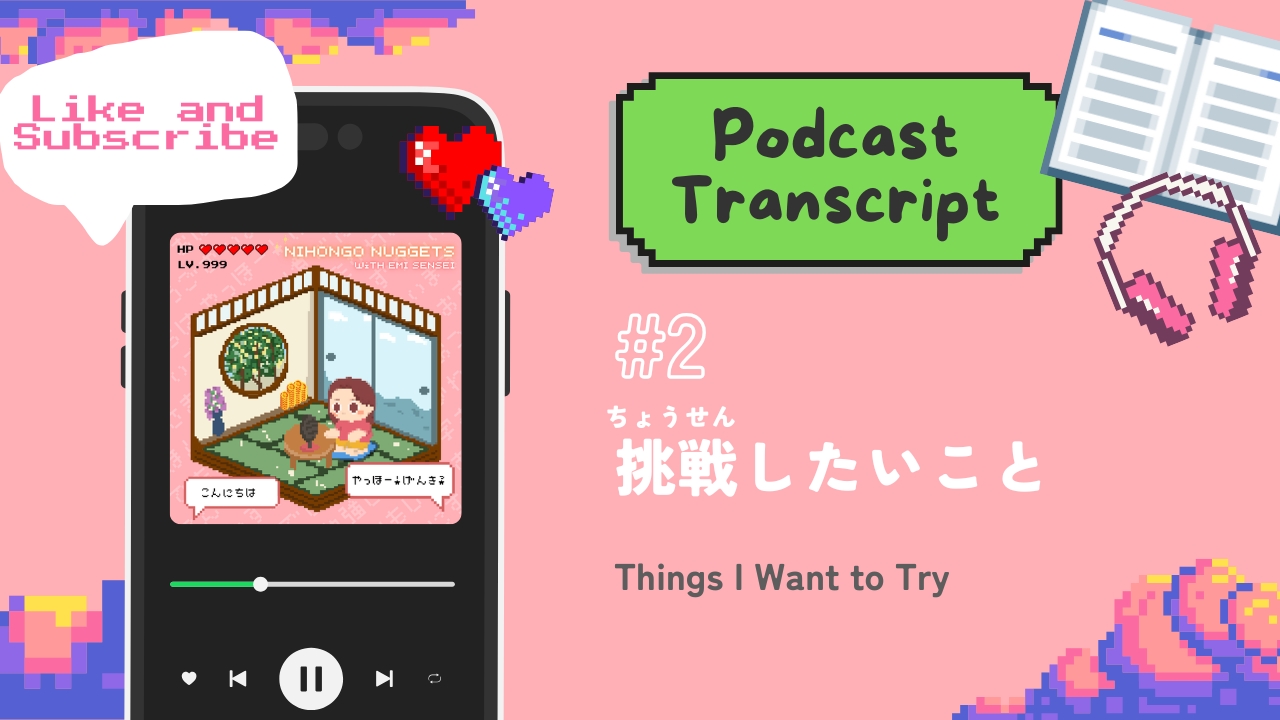
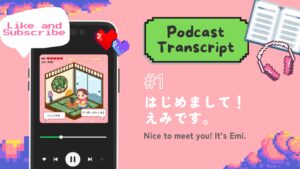
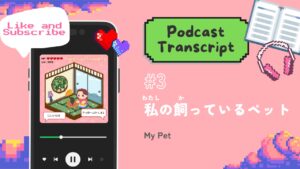


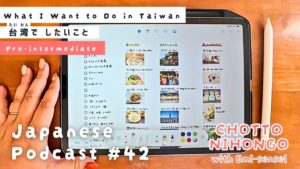
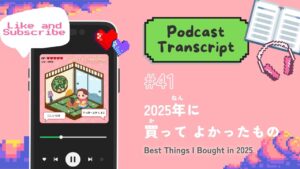
コメント|Comment